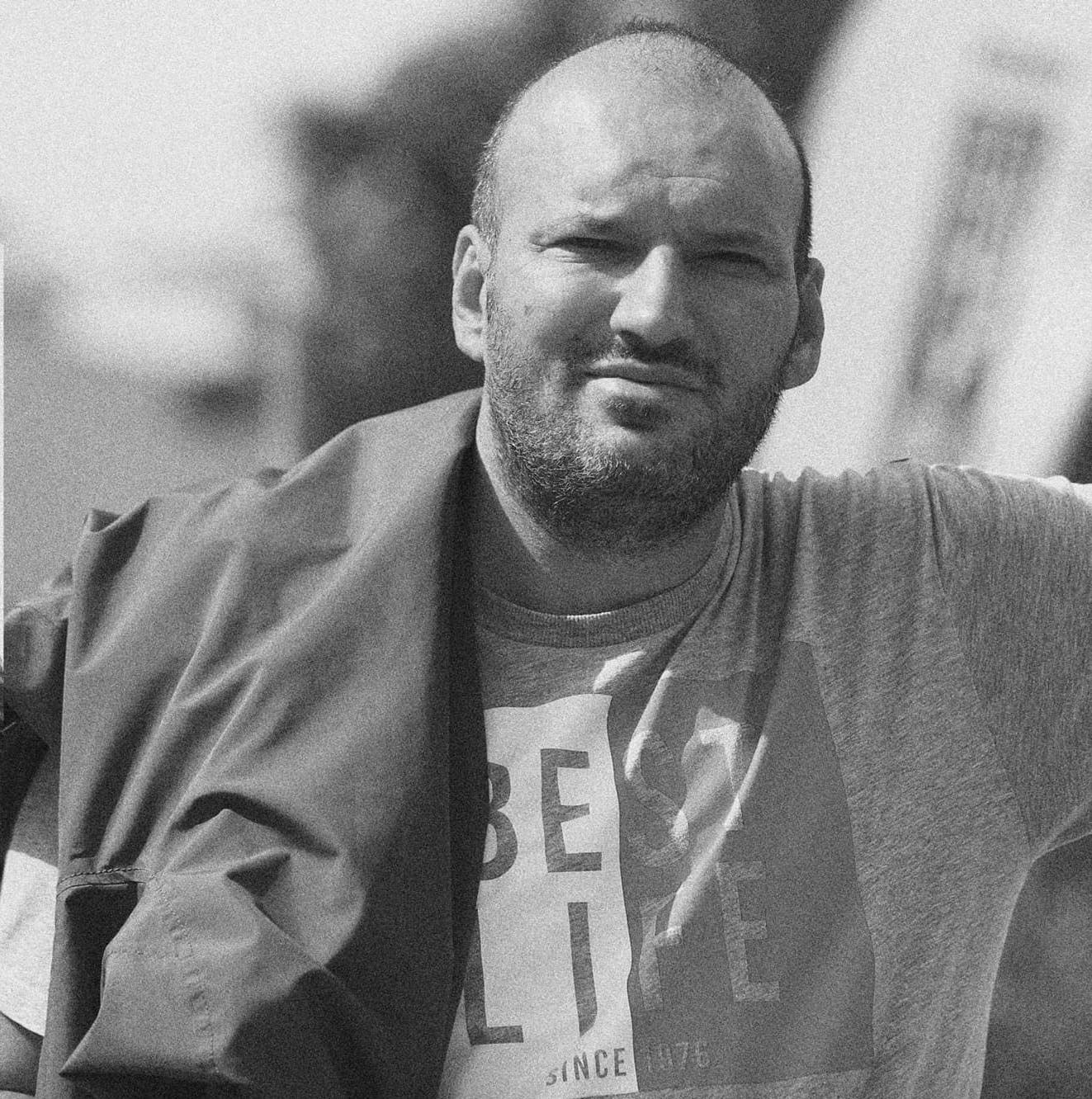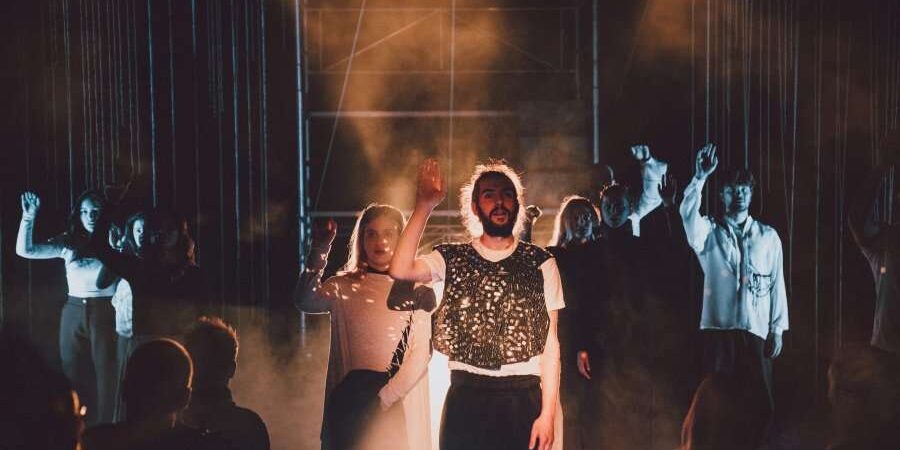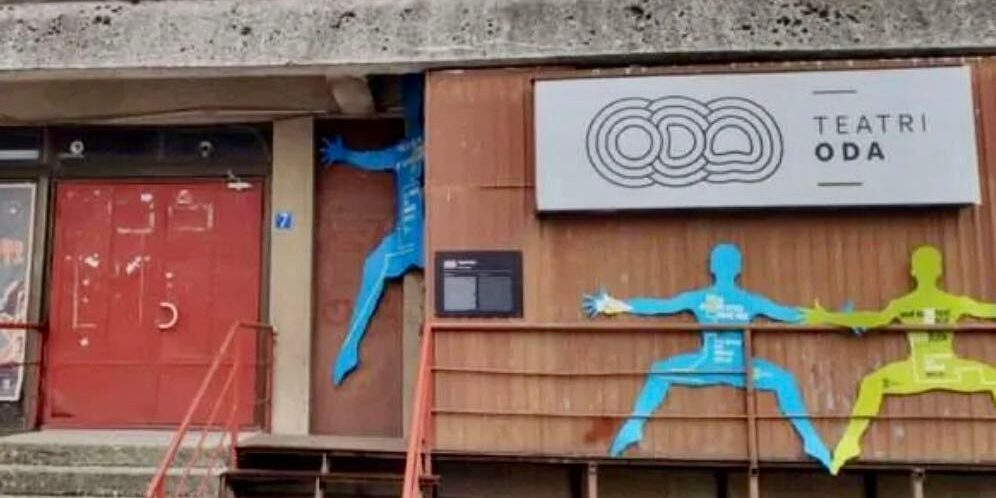Founded in 2003, the ODA Theatre, Kosovo’s only independent theatre, marks its 20th anniversary this year. Fatlinda Daku talks to director Florent Mehmeti about the history of the theatre and the role it plays in Kosovo’s cultural scene.
Fatlinda Daku: When you founded the Oda Theatre was there a particular need or gap in the cultural scene that you were hoping to fill?
Florent Mehmeti: At the time, [actor and co-founder] Lirak Çelaj and I were part of the management at the National Theatre. But there was a great demand from many groups in the artistic community for something different, something experimental, another alternative. We both knew that our next adventure after completing our mission at the National Theatre would be to establish an independent theatre, actually an independent theatre company.
After leaving the National Theatre, we started to make a master plan for what type of theatre we wanted to create, what shows we wanted to produce and where we could find support. You can imagine what Kosovo was like in 2002. It wasn’t easy at all. It was difficult to get support from the institutions at a time when Kosovo was consolidating the tax system and the budget was very low. The viewpoints and policies of UNMIK at that time have been very problematic in terms of access, and our orientation for funds has always been toward foreign donors.
The foundation of Oda has been supported by donors such as the British Council, the Soros foundation, and also the Kosovo Women’s Network through funds from their donors. This space used to be a discotheque called Tube. A friend of ours, an architect, had been managing this space and he proposed this space to us. On 21st March, 2003 the theatre opened with a production of The Vagina Monologues. The discotheque was open on weekends, while on weekdays we used it as a theatre. After a while, the discotheque was closed, and the management of the Palace of Youth gave us the opportunity to use it as a permanent theatre space.
Fatlinda Daku: Why did you choose to call the theatre ‘‘ODA’’?
Florent Mehmeti: When we first started discussing the name of our theatre company, we were looking for something authentically Albanian. Being in touch with the soul of Albanian storytelling, we settled on the name ODA. The original “Oda” in Albanian tradition was a gathering place where people would come together to share stories and ideas. It was forbidden to say “I think this is how it is” in an “Oda”. If you wanted to express your position on a certain problem, you had to tell a story. And that’s exactly what we do in our theatre. Even today, if you meet old people who have spent time in an oda, you can see that they have fantastic, quick-witted, and imaginative mind. They know how to create, edit, and rebuild stories to convey their approach to a problem.
The spirit of “oda” is all about openness to guests and community forums, and in my opinion, ODA Theatre has been an institution of storytelling and community gathering for the people of Prishtina.
Fatlinda Daku: How has the ODA’ Theatre’s artistic and cultural perspective evolved over 20 years?
Florent Mehmet: Over the past 20 years, ODA has undergone significant changes. As a theatre that strives to stay current and relevant, ODA has adapted to changing trends and incorporated them into its creative processes.
Collaborating with foreign producers has been particularly impactful in shaping the way ODA creates. These collaborations have allowed for a cross-pollination of ideas, where different perspectives and approaches are shared and explored. Through these collaborations, ODA has been able to push the boundaries of what is possible in theatre and experiment with new techniques and styles.

Florent Mehmeti
Fatlinda Daku: What is the role and importance of independent artistic spaces like Oda Theatre in promoting cultural expression and diversity in Kosovo’s cultural scene?
Florent Mehmeti: If you had asked me 20 years ago, I would be convinced that 10-15 theatres like the ODA Theatre would be founded, and they would have already made a significant impact on the cultural and artistic scene in Kosovo. Unfortunately, this has not been the case, and it is undoubtedly bad luck for Kosovo. It is not that there was no interest from the artistic community to create such theatres, but there was also a lack of stimulation from public policies, which is a very important thing.
In comparison to international standards, it is estimated that 1% of the citizens of a city will be active in the theatre. Starting from this, there should be at least five theatre houses in Prishtina. However, the reality is that there are only a few theatres in the city, and not all of them have adequate infrastructure or resources to support quality productions. It is essential to note that any other alternative space, whether it is the one where people meet for concerts, exhibitions, debates, or stage readings, enriches the cultural and artistic scene of Kosovo even more. These spaces provide a platform for artists to showcase their work, engage with the audience, and promote cultural exchange.
Fatlinda Daku: ODA Theatre has a reputation for producing challenging and thought-provoking work. What role can theatre play in addressing social and political issues?
Florent Mehmeti: Art has always played a crucial role in shaping and reflecting society. Through artistic expression, we are able to explore and understand complex social, cultural, and political issues in a way that is accessible to a wide range of people. Throughout our years of creating and performing art, we have always strived to use our platform to spark important discussions about social issues. We want to provoke the audience and politicians alike to reflect on these issues and hopefully create positive change. And I believe that we have been successful in doing so.
Here in Kosovo, we face a greater burden when it comes to social and political provocation. The situation in Kosovo and the Balkans is complex, and as artists, we feel a responsibility to address these issues through our work. It’s not just ODA that faces these challenges, but the entire theatre industry in Kosovo.
Fatlinda Daku: What are the main financial and logistical challenges that ODA Theatre has faced over the years?
Florent Mehmeti: The challenges that we face in the art scene here in Kosovo are numerous and multifaceted. At the core of these issues are bureaucratic obstacles and a lack of financial resources. As artists, we require a supportive and conducive environment that encourages creativity and artistic expression. However, this has not been the case in Kosovo, and we continue to struggle with these issues.
Another significant problem that we face is the lack of support for infrastructure and the development of artistic spaces. Artists require spaces that are not only affordable but also equipped with the necessary amenities that enable us to create and showcase our work effectively. Unfortunately, such spaces are scarce in Kosovo, and this has hindered our growth and development as artists.
Moreover, the lack of annual funding creates significant logistical problems for artists and organisations operating in the art sector. Without consistent and predictable funding, planning and executing artistic projects become challenging and uncertain. This instability often leads to the cancellation of projects and the abandonment of artistic initiatives.
Before, we did not have much financial support, but this has changed substantially in the past two years. We now have even more support, several times the amount in monetary value, and an annual program by the current Ministry of Youth, Culture and Sport.
Fatlinda Daku: What would you say are some of the most iconic and memorable performances in the history of ODA theatre?
Florent Mehmeti: We have had many successful events at ODA, but I would like to highlight the 2004 comedy Tre Gjermant e trashe, as it is the play with which the theatre is most closely associated. It was made at a time when we didn’t know exactly what we were doing at ODA and had no idea how the audience would receive us. However, this comedy became a hit and broke records in terms of audience attendance. If I’m not mistaken, it remains the most-watched play in Kosovo.
I would also like to mention our strategic partner, Blessed Unrest, which has become a second home for Teatri ODA. Together, we have created four co-productions with them that have been performed in New York, Prishtina, and various festivals in the region. One of these productions is the play Doruntina, which was unique in that it was performed in both Albanian and English. .
Another thing that comes to mind when we review the work of ODA is our participation in the Edinburgh Festival Fringe with Invisible Walls. What was special about this festival was that it dealt with the theme of isolation and was based on the true stories of the actors. The director of Summerhall, an Edinburgh arts venue, in a sign of solidarity with Kosovo’s isolation, raised the flag of Kosovo on the building during the festival. We did not expect such a gesture, and we felt very proud to be cultural diplomats of Kosovo in some way.

Afterloss, Teatri Oda
Fatlinda Daku: ODA has also hosted concerts, film, and other cultural events in addition to theatre productions. Can you talk about the role of ODA in promoting different forms of art and cultural expression in Kosovo?
Florent Mehmeti: We have always tried to give as much space as we have available, but of course, all these events have followed a programmatic line that we think is right, good and qualitative for our audience. It would have been great if we would have had a budget to organize cultural events, but we don’t have it. An essential partner that we had at ODA Theater was the Prishtina Jazz Festival, which is as old as ODA but unfortunately has been interrupted due to the lack of substantial budget support. This festival has been a collaborator of ODA and has been a reference point perhaps even in the region for a good, qualitative, and structured jazz festival. In addition, there is also ‘Rock for Rock’, which for me has been very special because they too have been a partner of ours, where every year on a day in June, the ODA stage has been available to some new rock bands and ODA has provided them with a start to their career in some form. It is very fulfilling when you see that many rock bands have started here at ODA and then developed further. There have been many other events as well, but mainly they have been musical events.
Fatlinda Daku: Looking ahead to the next 20 years, what are your hopes and aspirations for ODA, and what do you see as the biggest challenges that the theatre will face? How do you plan to meet those challenges while continuing to stay true to your artistic vision?
Florent Mehmeti: It is very complex because in Kosovo it is very difficult to create a vision for the future. I have often witnessed artistic projects being built and destroyed. It’s a bit chaotic and problematic to create a vision. However, if someone had told me 20 years ago that in 2023 I would be dealing with ODA’s problems on a daily basis, I think my motivation would have diminished greatly. I didn’t plan to stay at ODA for so long. I thought that after seven or ten years, I would withdraw from the daily work of the ODA theatre, but I couldn’t do it.
Nevertheless, my hopes for ODA are to create a team of new people who can work for the continuation of the institution’s mission. I also hope that there will be a change in the approach of the Municipality of Prishtina and that they understand that this space is first and foremost the space of Prishtina itself and its citizens, and is physically in the centre of the city and needs to be invested in more so that cultural work and service can be better for the public.
For more information, visit: TeatriOda.com
Further reading: review of Arbri by Lirak Çelaj at ODA Theatre
Further reading: Budgetary Woes and Endless Bureaucracy: the challenges of producing regional theatre in Kosovo
Fatlinda Daku is a human rights activist who is currently working as a researcher and freelance journalist. She studied Political Science at the University of Prishtina and has working experience in the civil society sector.








